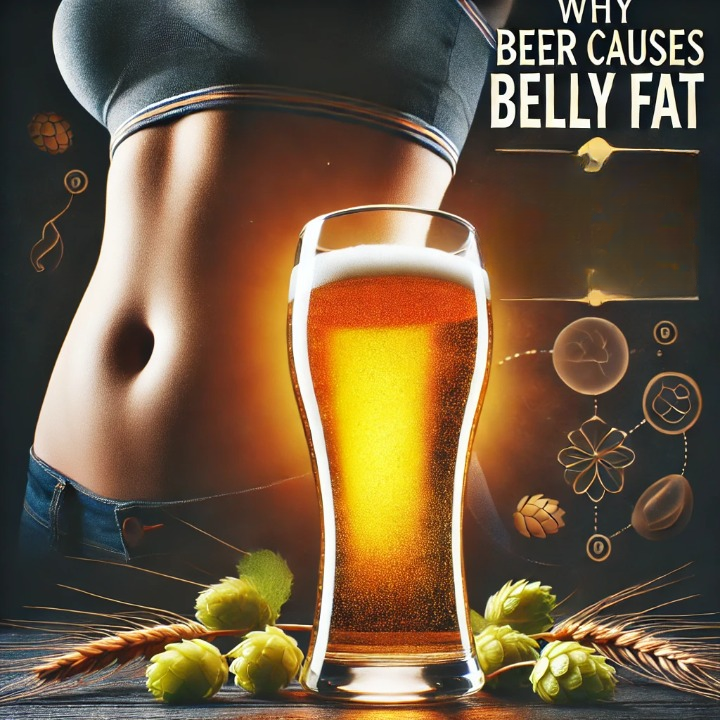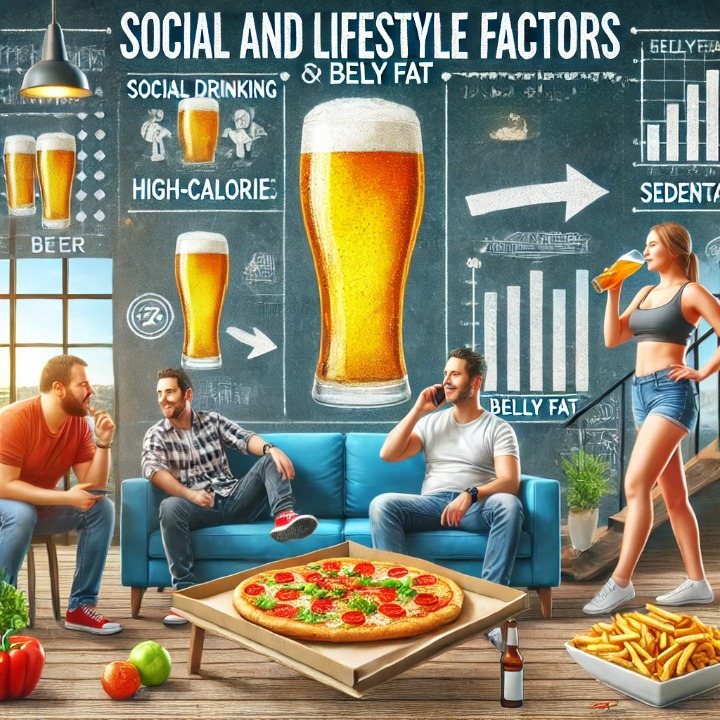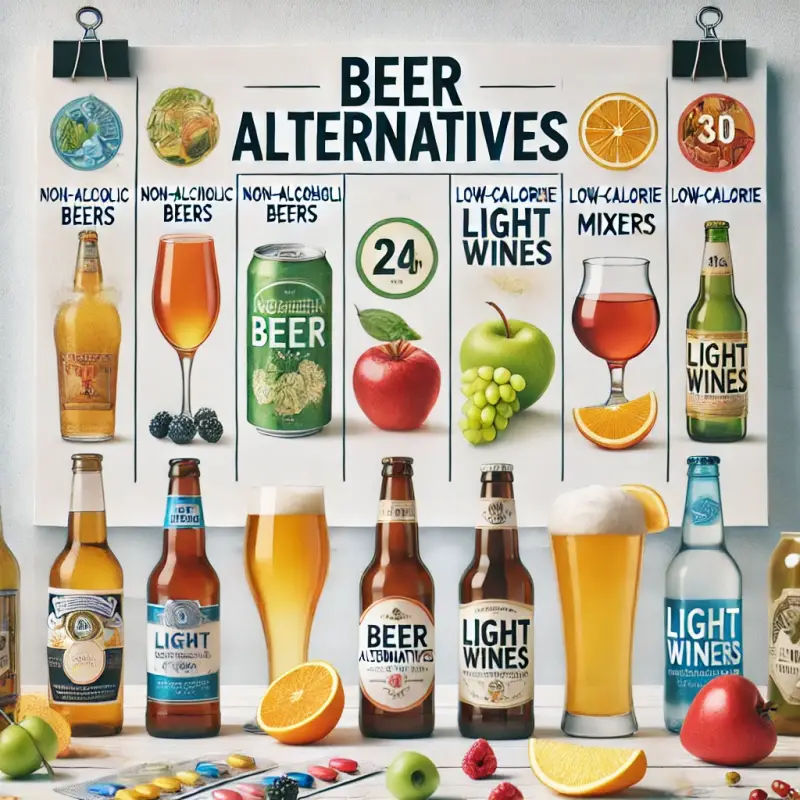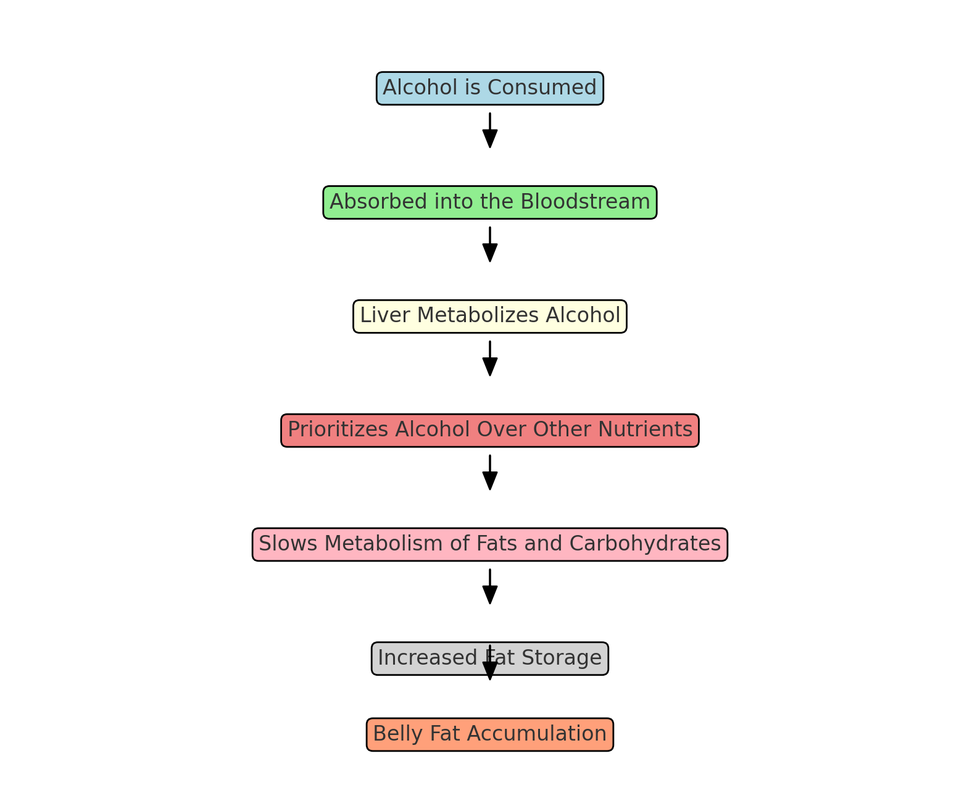Why Beer Causes Belly Fat?
Get ready to dive into the eye-opening truth about why beer causes belly fat and what you can do about it! If you've ever wondered why your favorite beverage might be contributing to those extra inches around your waist, you're in the right place.
In this article, we will dive deep into the reasons behind beer-induced belly fat and provide actionable tips on how to enjoy beer without the unwanted side effects.

Understanding Belly Fat
What is Belly Fat?
Belly fat, also known as abdominal fat, comes in two main types: subcutaneous fat and visceral fat. Subcutaneous fat is the layer of fat located just beneath the skin. It's the kind you can pinch.
Visceral fat, on the other hand, surrounds your internal organs and is more dangerous due to its association with various health issues like heart disease and type 2 diabetes.
According to a study published in the Journal of the American College of Cardiology, visceral fat is particularly concerning because it releases inflammatory substances that can negatively impact your body's organs and metabolic processes.
General Causes of Belly Fat
Several factors contribute to the accumulation of belly fat, including:
- Diet: High intake of sugary foods and drinks, refined carbohydrates, and trans fats can lead to weight gain and increased belly fat.
- Lack of Exercise: Sedentary lifestyles result in fewer calories burned and more stored fat.
- Genetics: Your genetic makeup can influence where your body stores fat.
- Stress: Chronic stress leads to higher levels of cortisol, a hormone linked to increased abdominal fat.
Understanding these general causes helps set the stage for comprehending how beer specifically contributes to belly fat.
The Connection Between Beer and Belly Fat
What is Beer Belly?
A beer belly is a colloquial term used to describe the accumulation of fat around the abdomen, often associated with excessive beer consumption. This phenomenon is not just a myth; there is scientific evidence supporting the link between beer consumption and increased belly fat.
How Alcohol is Metabolized
When you consume alcohol, your body prioritizes metabolizing it over other nutrients. This is because alcohol is considered a toxin, and your liver works hard to break it down and remove it from your system. Here's a simplified breakdown of how this process works:
- Alcohol is Absorbed: Upon drinking, alcohol is rapidly absorbed into the bloodstream through the stomach and small intestine.
- Liver Metabolizes Alcohol: The liver processes alcohol at a rate of about one standard drink per hour.
- Fat Storage: While the liver focuses on metabolizing alcohol, other metabolic processes slow down, leading to increased fat storage, particularly around the abdomen.
According to the National Institute on Alcohol Abuse and Alcoholism (NIAAA), this shift in metabolic priorities can lead to weight gain over time, especially when combined with the high caloric content of alcoholic beverages.
Calories in Beer
Beer is calorie-dense, and those calories can add up quickly. Here's a table showing the approximate caloric content of different types of beer:
| Type of beer | Calories per 12 oz (355 ml) |
|---|---|
| Light Beer | 90-110 |
| Regular Beer | 150-200 |
| Craft/High-Alcohol Beer | 200-300 |
These empty calories provide little nutritional value but significantly contribute to your daily caloric intake. Consuming beer regularly without adjusting your diet or increasing your physical activity can lead to weight gain and belly fat accumulation.
Ingredients in Beer That Contribute to Belly Fat
Carbohydrates in Beer
Beer contains various types of carbohydrates, including simple sugars and maltose. Maltose is a high-glycemic carbohydrate that rapidly increases blood sugar levels.
This spike in blood sugar can lead to increased insulin production, which promotes fat storage, particularly in the abdominal area.
According to research published in the American Journal of Clinical Nutrition, high-glycemic foods and beverages are linked to increased abdominal fat, making beer a significant contributor to belly fat.
Alcohol and Fat Storage
Alcohol consumption can promote fat storage in several ways:
- Hormonal Effects: Alcohol affects hormones such as insulin and cortisol. Elevated insulin levels encourage fat storage, while higher cortisol levels are linked to increased belly fat.
- Caloric Surplus: Regular alcohol consumption often leads to a caloric surplus, where the body stores excess calories as fat.
A study from the International Journal of Obesity found that regular alcohol consumption, particularly beer, is associated with an increased risk of abdominal obesity.
This section of the article has covered the basics of why beer causes belly fat, including the types of belly fat, how beer affects your body's metabolism, and the specific ingredients in beer that contribute to fat accumulation.
Next, we will dive deeper into how beer consumption affects your body in various ways.
Drinking beer can significantly impact your appetite, often leading to increased hunger and cravings. This phenomenon is known as the "aperitif effect," where alcohol consumption stimulates appetite.
According to a study published in the journal Appetite, alcohol can increase the levels of ghrelin, a hormone that promotes hunger, making you more likely to consume additional calories.
Additionally, alcohol can impair your judgment, leading to poorer food choices. This often results in consuming high-calorie, unhealthy foods such as pizza, chips, and other snacks commonly associated with drinking.
These added calories contribute to overall weight gain and specifically to belly fat accumulation.
Effect on Exercise
Regular beer consumption can also negatively affect your exercise routine and physical performance. Alcohol is a diuretic, leading to dehydration, which can impair muscle function and recovery.
Dehydration affects your energy levels, making it harder to stay active and perform well during workouts.
Moreover, heavy drinking can lead to a decrease in muscle protein synthesis, the process by which your body builds muscle. This can hinder muscle growth and recovery, reducing the effectiveness of your workouts.
A study in the Journal of Strength and Conditioning Research found that alcohol consumption after exercise significantly reduces muscle protein synthesis, impacting overall fitness progress.
Influence on Sleep
Quality sleep is crucial for maintaining a healthy weight and overall well-being. However, beer consumption can disrupt your sleep patterns, leading to poor sleep quality.
Alcohol initially acts as a sedative, helping you fall asleep faster, but it disrupts the sleep cycle, particularly the REM (Rapid Eye Movement) stage.
Interrupted REM sleep can lead to daytime fatigue, reduced cognitive function, and increased stress levels, all of which can contribute to weight gain and belly fat.
According to the Sleep Foundation, poor sleep quality is closely linked to higher levels of the stress hormone cortisol, which promotes fat storage in the abdominal area.
Social and Lifestyle Factors

Social Drinking Habits
Beer is often consumed in social settings, where the frequency and quantity of consumption can increase. Social drinking can lead to binge drinking, where large amounts of beer are consumed in a short period.
Binge drinking not only increases caloric intake but also stresses the liver and other metabolic processes, promoting fat storage.
Accompanying Foods
The foods typically consumed with beer are usually high in calories and unhealthy fats. Think of popular bar snacks like nachos, wings, and fries. These foods are often rich in trans fats and sugars, which are known to contribute to weight gain and belly fat.
According to a study in the American Journal of Clinical Nutrition, diets high in trans fats are associated with increased abdominal fat deposition.
Sedentary Lifestyle
Drinking sessions are often associated with sedentary behavior, where individuals spend extended periods sitting and consuming alcohol. This lack of physical activity contributes to weight gain and fat accumulation.
After drinking, the likelihood of engaging in physical activities decreases, further promoting a sedentary lifestyle.
Studies and Research on Beer and Belly Fat
Scientific Evidence
Numerous studies have established a connection between beer consumption and belly fat. For instance, a study published in the European Journal of Clinical Nutrition examined the relationship between beer intake and abdominal obesity in over 2,000 adults.
The results indicated that higher beer consumption is significantly associated with an increase in waist circumference.
Another study in the Journal of Nutrition highlighted that men who consume more than three beers per day are at a higher risk of developing abdominal obesity compared to those who drink less or abstain.
These studies underscore the direct link between beer consumption and the accumulation of belly fat.
Expert Opinions
Nutritionists and health experts agree that while moderate beer consumption can be part of a balanced lifestyle, excessive intake is detrimental to maintaining a healthy weight. Dr. Susan Jebb, a professor of diet and population health at the University of Oxford, emphasizes that "alcohol is a significant source of excess calories and, coupled with its effects on appetite and decision-making, can lead to an increase in belly fat."
Tips to Enjoy Beer Without Gaining Belly Fat
Moderation is Key
One of the most effective ways to prevent belly fat while still enjoying beer is to practice moderation. According to the Centers for Disease Control and Prevention (CDC), moderate drinking is defined as up to one drink per day for women and up to two drinks per day for men.
Sticking to these guidelines can help manage caloric intake and reduce the risk of weight gain.
Choose Lower-Calorie Options
Opting for light beers or those with lower alcohol content can significantly reduce your calorie intake. For example, a standard light beer contains about 90-110 calories, compared to a regular beer, which can have up to 200 calories.
There are also several brands offering low-carb or gluten-free beer options that can be a healthier choice.
Stay Active
Incorporating regular physical activity into your routine can help offset the calories consumed from beer.
Aim for at least 150 minutes of moderate-intensity aerobic activity or 75 minutes of vigorous-intensity activity each week, as recommended by the World Health Organization (WHO). Activities like walking, cycling, and swimming can help burn calories and maintain a healthy weight.
Healthy Eating Habits
Pairing beer with healthier food choices can also mitigate the risk of belly fat. Instead of high-calorie snacks, opt for nuts, vegetables, or lean proteins.
Incorporating a balanced diet rich in fruits, vegetables, whole grains, and lean proteins can help maintain a healthy weight and reduce belly fat.
Learn more about healthy eating habits from the NSH.
Alternatives to Beer
Non-Alcoholic Beers
For those who enjoy the taste of beer but want to avoid the calories and alcohol, non-alcoholic beers are a great alternative. These beverages typically contain fewer calories and can be a refreshing option without the risk of belly fat.

Other Low-Calorie Alcoholic Beverages
Consider switching to other low-calorie alcoholic beverages like wine or spirits with low-calorie mixers. For instance, a glass of dry wine contains about 120 calories, and a shot of vodka mixed with soda water and lime has about 96 calories. These alternatives can satisfy your craving for a drink without adding extra calories.
Long-Term Health Implications
Health Risks of Excess Belly Fat
Excess belly fat is not just a cosmetic concern; it poses significant health risks. Belly fat, particularly visceral fat, is linked to several serious health conditions, including:
- Heart Disease: Visceral fat releases inflammatory substances that can increase the risk of heart disease.
- Type 2 Diabetes: Excess belly fat is a major risk factor for developing insulin resistance and type 2 diabetes.
- Liver Disease: Fat accumulation around the liver can lead to fatty liver disease, which can progress to liver damage.
- Metabolic Syndrome: A cluster of conditions including high blood pressure, high blood sugar, and abnormal cholesterol levels, which increase the risk of heart disease, stroke, and diabetes.
Benefits of Reducing Belly Fat
Reducing belly fat can significantly improve overall health and well-being. Benefits include:
- Improved Cardiovascular Health: Lowering visceral fat reduces the risk of heart disease and improves heart function.
- Better Insulin Sensitivity: Reducing belly fat can enhance insulin sensitivity, decreasing the risk of type 2 diabetes.
- Enhanced Liver Function: Lower fat levels around the liver can prevent fatty liver disease and improve liver health.
- Improved Metabolic Health: Reducing belly fat helps regulate blood pressure, blood sugar, and cholesterol levels, improving overall metabolic health.
Learn more about the health benefits of reducing belly fat from the Mayo Clinic.
Frequently asked questions About Beer and Belly Fat
Does drinking beer cause belly fat in everyone?
Not everyone who drinks beer will develop belly fat, but regular and excessive consumption increases the risk. Genetics, lifestyle, and overall diet also play significant roles.
How quickly can beer contribute to belly fat?
The timeline varies depending on individual metabolism, the amount of beer consumed, and overall lifestyle. Regular excessive drinking can lead to noticeable weight gain within a few weeks to months.
Can switching to light beer help reduce belly fat?
Yes, switching to light beer can reduce calorie intake, which may help manage weight. However, it's essential to also consider overall diet and physical activity.
Is beer the only alcoholic drink that causes belly fat?
No, all alcoholic drinks contain calories and can contribute to weight gain if consumed in excess. Beer is often singled out due to its high carbohydrate content and typical consumption patterns.
How can I tell if my belly fat is due to beer?
If you notice weight gain primarily around your abdomen and you consume beer regularly, it is likely contributing to your belly fat. Reducing or eliminating beer and monitoring changes in your weight can help confirm this.

Here is a flowchart illustrating the process of alcohol metabolism and how it leads to belly fat accumulation. This visual representation shows the step-by-step progression from alcohol consumption to increased fat storage around the abdomen.
Conclusion
Summary of Key Points
In this comprehensive guide, we've explored why beer causes belly fat and how various factors like alcohol metabolism, caloric content, and lifestyle choices contribute to this issue.
We've also provided tips on how to enjoy beer responsibly and maintain a healthy weight.
We encourage you to share your thoughts and experiences in the comments below!
Banana oatmeal
There's a NEW way to burn off a lot of belly fat, and…
It has nothing to do with meal plans, cardio or counting calories.
It's based on a recent discovery that targets belly fat just by adding one new thing to your diet.
You can have it with breakfast, lunch or dinner…
Just make sure you have it at least once a day if you have 20lbs or more to lose.
>>>Do This Before Breakfast To Melt Away 71lbs of Dangerous Belly Fat






Add comment
Comments